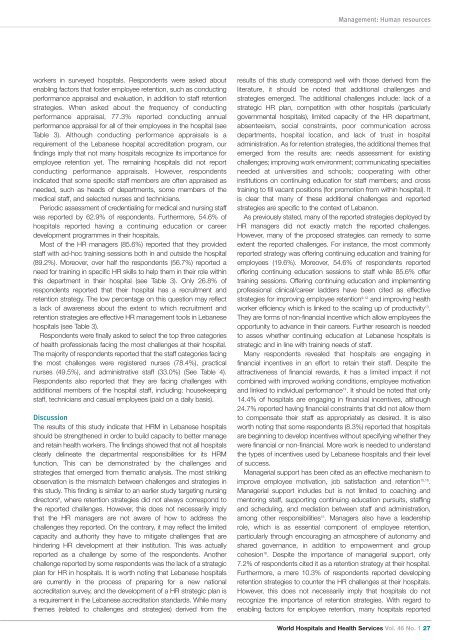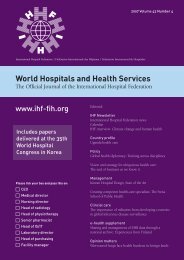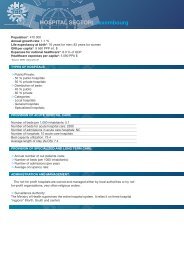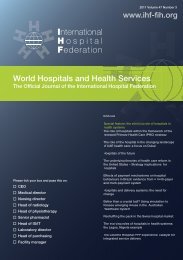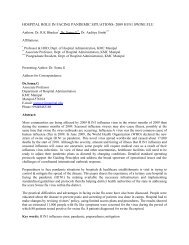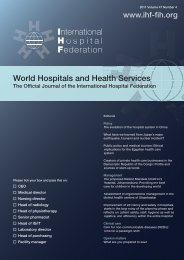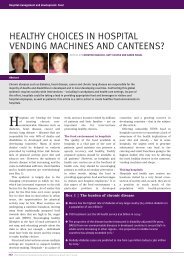vol46.1 LR.pdf - International Hospital Federation
vol46.1 LR.pdf - International Hospital Federation
vol46.1 LR.pdf - International Hospital Federation
You also want an ePaper? Increase the reach of your titles
YUMPU automatically turns print PDFs into web optimized ePapers that Google loves.
Management: Human resources<br />
workers in surveyed hospitals. Respondents were asked about<br />
enabling factors that foster employee retention, such as conducting<br />
performance appraisal and evaluation, in addition to staff retention<br />
strategies. When asked about the frequency of conducting<br />
performance appraisal, 77.3% reported conducting annual<br />
performance appraisal for all of their employees in the hospital (see<br />
Table 3). Although conducting performance appraisals is a<br />
requirement of the Lebanese hospital accreditation program, our<br />
findings imply that not many hospitals recognize its importance for<br />
employee retention yet. The remaining hospitals did not report<br />
conducting performance appraisals. However, respondents<br />
indicated that some specific staff members are often appraised as<br />
needed, such as heads of departments, some members of the<br />
medical staff, and selected nurses and technicians.<br />
Periodic assessment of credentialing for medical and nursing staff<br />
was reported by 62.9% of respondents. Furthermore, 54.6% of<br />
hospitals reported having a continuing education or career<br />
development programmes in their hospitals.<br />
Most of the HR managers (85.6%) reported that they provided<br />
staff with ad-hoc training sessions both in and outside the hospital<br />
(89.2%). Moreover, over half the respondents (56.7%) reported a<br />
need for training in specific HR skills to help them in their role within<br />
this department in their hospital (see Table 3). Only 26.8% of<br />
respondents reported that their hospital has a recruitment and<br />
retention strategy. The low percentage on this question may reflect<br />
a lack of awareness about the extent to which recruitment and<br />
retention strategies are effective HR management tools in Lebanese<br />
hospitals (see Table 3).<br />
Respondents were finally asked to select the top three categories<br />
of health professionals facing the most challenges at their hospital.<br />
The majority of respondents reported that the staff categories facing<br />
the most challenges were registered nurses (78.4%), practical<br />
nurses (49.5%), and administrative staff (33.0%) (See Table 4).<br />
Respondents also reported that they are facing challenges with<br />
additional members of the hospital staff, including: housekeeping<br />
staff, technicians and casual employees (paid on a daily basis).<br />
Discussion<br />
The results of this study indicate that HRM in Lebanese hospitals<br />
should be strengthened in order to build capacity to better manage<br />
and retain health workers. The findings showed that not all hospitals<br />
clearly delineate the departmental responsibilities for its HRM<br />
function. This can be demonstrated by the challenges and<br />
strategies that emerged from thematic analysis. The most striking<br />
observation is the mismatch between challenges and strategies in<br />
this study. This finding is similar to an earlier study targeting nursing<br />
directors 6 , where retention strategies did not always correspond to<br />
the reported challenges. However, this does not necessarily imply<br />
that the HR managers are not aware of how to address the<br />
challenges they reported. On the contrary, it may reflect the limited<br />
capacity and authority they have to mitigate challenges that are<br />
hindering HR development at their institution. This was actually<br />
reported as a challenge by some of the respondents. Another<br />
challenge reported by some respondents was the lack of a strategic<br />
plan for HR in hospitals. It is worth noting that Lebanese hospitals<br />
are currently in the process of preparing for a new national<br />
accreditation survey, and the development of a HR strategic plan is<br />
a requirement in the Lebanese accreditation standards. While many<br />
themes (related to challenges and strategies) derived from the<br />
results of this study correspond well with those derived from the<br />
literature, it should be noted that additional challenges and<br />
strategies emerged. The additional challenges include: lack of a<br />
strategic HR plan, competition with other hospitals (particularly<br />
governmental hospitals), limited capacity of the HR department,<br />
absenteeism, social constraints, poor communication across<br />
departments, hospital location, and lack of trust in hospital<br />
administration. As for retention strategies, the additional themes that<br />
emerged from the results are: needs assessment for existing<br />
challenges; improving work environment; communicating specialties<br />
needed at universities and schools; cooperating with other<br />
institutions on continuing education for staff members; and cross<br />
training to fill vacant positions (for promotion from within hospital). It<br />
is clear that many of these additional challenges and reported<br />
strategies are specific to the context of Lebanon.<br />
As previously stated, many of the reported strategies deployed by<br />
HR managers did not exactly match the reported challenges.<br />
However, many of the proposed strategies can remedy to some<br />
extent the reported challenges. For instance, the most commonly<br />
reported strategy was offering continuing education and training for<br />
employees (19.6%). Moreover, 54.6% of respondents reported<br />
offering continuing education sessions to staff while 85.6% offer<br />
training sessions. Offering continuing education and implementing<br />
professional clinical/career ladders have been cited as effective<br />
strategies for improving employee retention 9-12 and improving health<br />
worker efficiency which is linked to the scaling up of productivity 13 .<br />
They are forms of non-financial incentive which allow employees the<br />
opportunity to advance in their careers. Further research is needed<br />
to asses whether continuing education at Lebanese hospitals is<br />
strategic and in line with training needs of staff.<br />
Many respondents revealed that hospitals are engaging in<br />
financial incentives in an effort to retain their staff. Despite the<br />
attractiveness of financial rewards, it has a limited impact if not<br />
combined with improved working conditions, employee motivation<br />
and linked to individual performance 14 . It should be noted that only<br />
14.4% of hospitals are engaging in financial incentives, although<br />
24.7% reported having financial constraints that did not allow them<br />
to compensate their staff as appropriately as desired. It is also<br />
worth noting that some respondents (8.3%) reported that hospitals<br />
are beginning to develop incentives without specifying whether they<br />
were financial or non-financial. More work is needed to understand<br />
the types of incentives used by Lebanese hospitals and their level<br />
of success.<br />
Managerial support has been cited as an effective mechanism to<br />
improve employee motivation, job satisfaction and retention 15,16 .<br />
Managerial support includes but is not limited to coaching and<br />
mentoring staff, supporting continuing education pursuits, staffing<br />
and scheduling, and mediation between staff and administration,<br />
among other responsibilities 15 . Managers also have a leadership<br />
role, which is as essential component of employee retention,<br />
particularly through encouraging an atmosphere of autonomy and<br />
shared governance, in addition to empowerment and group<br />
cohesion 16 . Despite the importance of managerial support, only<br />
7.2% of respondents cited it as a retention strategy at their hospital.<br />
Furthermore, a mere 10.3% of respondents reported developing<br />
retention strategies to counter the HR challenges at their hospitals.<br />
However, this does not necessarily imply that hospitals do not<br />
recognize the importance of retention strategies. With regard to<br />
enabling factors for employee retention, many hospitals reported<br />
World <strong>Hospital</strong>s and Health Services Vol. 46 No. 1 27


